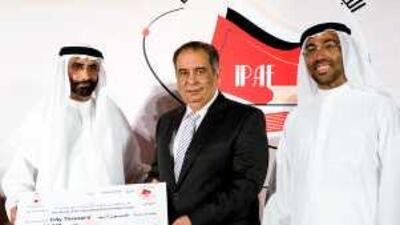Yusuf Zeydan has won the International Prize for Arabic Fiction (IPAF) with his novel Beelzebub, it was announced at a ceremony in Abu Dhabi last night. The Egyptian author was one of six writers to be shortlisted for the prize, otherwise known as the Arabic Booker, and wins a total of US$60,000 (Dh220,380) as well as a guaranteed English translation. Beelzebub is a poetically told story of the religious and cultural schisms caused by the Roman Empire's appropriation of Christianity in the fifth century in upper Egypt, Alexandria and northern Syria. Receiving his prize from Mohammed Ahmad al Bowardi, the Secretary General of the Executive Council and board member of the Emirates Foundation, Zeydan said: "This prize is indeed a landmark in my life that will make me deal with even more seriousness in my approach to writing, and will encourage me to surpass borders in creativity. This prize is distinguished by its integrity, its international calibre and the fact that it is closely related to the long-standing Booker Prize. There is no doubt that the precise work of analysing the novels will contribute to the interaction between Arabic and international literature."
Each of the five other finalists receives US$10,000. The IPAF, an award for the best new novel in the Arabic language, was officially launched in 2007. It is a collaboration between the philanthropic Emirates Foundation and the British charity the Booker Foundation, which awards the Man Booker Prize. Dr Jonathan Taylor, the chairman of the Booker Prize Foundation and chairman of the board of trustees for the IPAF, said before the award: "I think what the two prizes have shown, with the enormous number of entries from all over the Arab world, is that there's a huge wealth of high-quality fiction in Arabic. What this award will do is to make the literature available both in translation and to get it more widely read in the Arabic world."
In a speech at the ceremony, Ahmed Ali al Sayegh, the managing director of the Emirates Foundation, commented: "The IPAF award is one of the best ways to support both new Arab creative writing and its translation into the world's leading languages." He emphasised that a key long-term aim for the prize was "to increase global readership of Arabic literature, through the widest possible publication and distribution of contemporary Arabic fiction in translation". gchamp@thenational.ae

